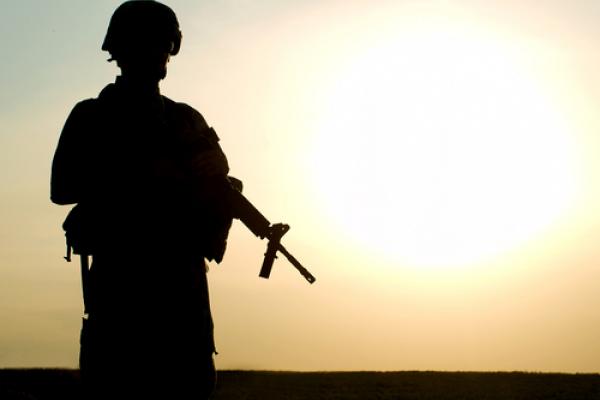A 10-year-old boy holding a grenade approaches a group of soldiers. He does not respond to their shouts. One shoots him with his M-16 and the boy crumbles to the ground, dead.
Did he have a choice? It was do or die, kill or be killed. Still he killed a little boy, and those images still haunt him.
This is a classic example of psychological trauma: A person is put in horrific life-threatening situation where they do not feel they have control. That's the situation he found himself in. It was a no-win scenario — kill a little boy or have you and your friends all die.
Soldier suicides have reached epidemic numbers. As the AP reports, More soldiers are taking their own lives than are falling in battle. Add on top of that, the many who suffer from PTSD, and who as a result find themselves estranged from their home, their loved ones, and indeed from themselves.
This is about experiencing trauma, and, with multiple deployments, being repeatedly re-exposed to trauma. It's about people who have seen or done things that they can't forget, things that may haunt them for the rest of their lives. It's about people like you and me carrying the horrors of the reality of war, and often they are carrying those burdens completely alone.
There's a tendency in the media to romanticize war, and to speak of soldiers as "heroes." While we may think we are showing respect in doing this, in fact this romantic view simply does not line up with the reality of what they experience in war, and can instead make soldiers feel even more disconnected. Soldiers are not invulnerable "super heroes" (nor are they villains for that matter as some others like to paint them). They are simply human beings — human beings who have been put in the middle of horrific situations.
Our bumper stickers say "support our troops," but if we really care about our service men and women, then we need to wake up to the very real fact that many of them have had their worlds shattered. On returning home they need more than just a parade, they need real support. Regardless of what you think about this war or any war, I'd like to suggest that we all should support our troops — not as warriors, but as people. We need to get away from the rhetoric of either glorifying or demonizing soldiers, and instead treat them as fellow human beings like us.
Trauma disrupts a person's sense of security and connection to themselves and others. Consequently there is a deep need to make sense of the world afterwards, to recalibrate reality. For many soldiers that means bridging the disconnect between their experience of war, and the "real world" which can now seem so unreal. Simply "trying to forget" and bury the past is not enough.
That's why it's so important that we to provide the soldiers in our lives with a safe space to work through what they experienced. We need to have the courage and the compassion to hear their stories, told in their own time and on their own terms. We need to listen, without judgment, to what they have to tell us. It's a difficult conversation, but one that we as a country need to be willing to have.
As a Christian this is a difficult issue because the church has tended to fall into one of two polarized camps: either romanticizing military service on the conservative side or condemning and demonizing it on the liberal side. The rest of us end up caught in the middle, and often simply fall silent. I want to break the silence. I want to speak up from the radical center with a message of unconditional grace.
As so many soldiers struggle with feeling profoundly estranged and dehumanized by what they have seen and done, as they work through the fallout of divorce, depression, unemployment, and the crushing feelings of abandonment that accompanies all of this (including feeling abandoned by the military when they are denied benefits) what they deeply need to hear from us is a message of grace. They need to experience in us what God's unconditional embrace looks like. They need to know that we will stand beside them, even when it is messy and scary. We all need that.
Derek Flood (TheRebelGod.com) is the author of Healing the Gospel and a featured blogger on the Huffington Post.
Silhouette of U.S. soldier, © Oleg Zabielin | View Portfolio / Shutterstock.com
Got something to say about what you're reading? We value your feedback!
